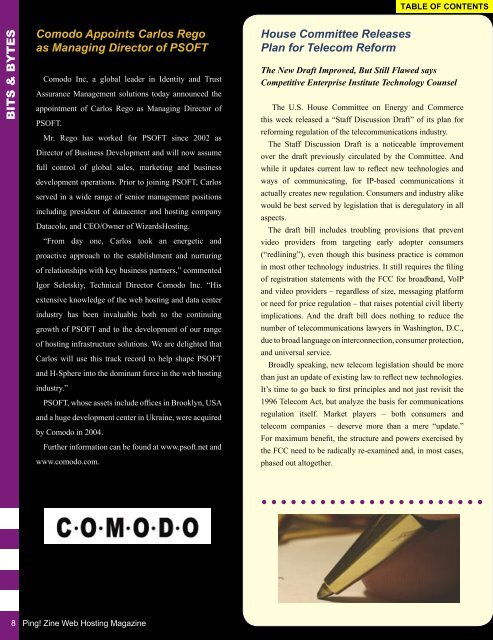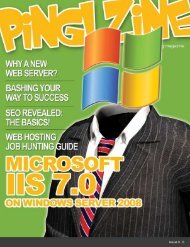bits & bytes - Ping! Zine Web Tech Magazine
bits & bytes - Ping! Zine Web Tech Magazine
bits & bytes - Ping! Zine Web Tech Magazine
You also want an ePaper? Increase the reach of your titles
YUMPU automatically turns print PDFs into web optimized ePapers that Google loves.
BITS & BYTES<br />
Comodo Appoints Carlos Rego<br />
as Managing Director of PSOFT<br />
Comodo Inc, a global leader in Identity and Trust<br />
Assurance Management solutions today announced the<br />
appointment of Carlos Rego as Managing Director of<br />
PSOFT.<br />
Mr. Rego has worked for PSOFT since 2002 as<br />
Director of Business Development and will now assume<br />
full control of global sales, marketing and business<br />
development operations. Prior to joining PSOFT, Carlos<br />
served in a wide range of senior management positions<br />
including president of datacenter and hosting company<br />
Datacolo, and CEO/Owner of WizardsHosting.<br />
“From day one, Carlos took an energetic and<br />
proactive approach to the establishment and nurturing<br />
of relationships with key business partners,” commented<br />
Igor Seletskiy, <strong>Tech</strong>nical Director Comodo Inc. “His<br />
extensive knowledge of the web hosting and data center<br />
industry has been invaluable both to the continuing<br />
growth of PSOFT and to the development of our range<br />
of hosting infrastructure solutions. We are delighted that<br />
Carlos will use this track record to help shape PSOFT<br />
and H-Sphere into the dominant force in the web hosting<br />
industry.”<br />
PSOFT, whose assets include offices in Brooklyn, USA<br />
and a huge development center in Ukraine, were acquired<br />
by Comodo in 2004.<br />
Further information can be found at www.psoft.net and<br />
www.comodo.com.<br />
House Committee Releases<br />
Plan for Telecom Reform<br />
The New Draft Improved, But Still Flawed says<br />
Competitive Enterprise Institute <strong>Tech</strong>nology Counsel<br />
The U.S. House Committee on Energy and Commerce<br />
this week released a “Staff Discussion Draft” of its plan for<br />
reforming regulation of the telecommunications industry.<br />
The Staff Discussion Draft is a noticeable improvement<br />
over the draft previously circulated by the Committee. And<br />
while it updates current law to reflect new technologies and<br />
ways of communicating, for IP-based communications it<br />
actually creates new regulation. Consumers and industry alike<br />
would be best served by legislation that is deregulatory in all<br />
aspects.<br />
The draft bill includes troubling provisions that prevent<br />
video providers from targeting early adopter consumers<br />
(“redlining”), even though this business practice is common<br />
in most other technology industries. It still requires the filing<br />
of registration statements with the FCC for broadband, VoIP<br />
and video providers – regardless of size, messaging platform<br />
or need for price regulation – that raises potential civil liberty<br />
implications. And the draft bill does nothing to reduce the<br />
number of telecommunications lawyers in Washington, D.C.,<br />
due to broad language on interconnection, consumer protection,<br />
and universal service.<br />
Broadly speaking, new telecom legislation should be more<br />
than just an update of existing law to reflect new technologies.<br />
It’s time to go back to first principles and not just revisit the<br />
1996 Telecom Act, but analyze the basis for communications<br />
regulation itself. Market players – both consumers and<br />
telecom companies – deserve more than a mere “update.”<br />
For maximum benefit, the structure and powers exercised by<br />
the FCC need to be radically re-examined and, in most cases,<br />
phased out altogether.<br />
.......................<br />
8 <strong>Ping</strong>! <strong>Zine</strong> <strong>Web</strong> Hosting <strong>Magazine</strong>
















